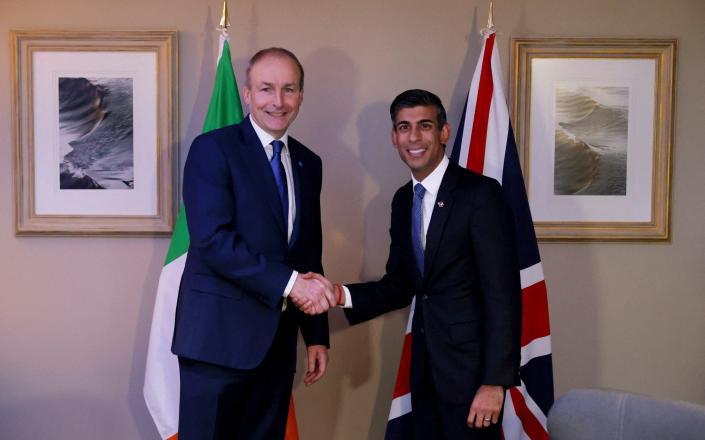
Rishi Sunak believes a deal with the EU to end the Brexit border stand-off can be clinched by Christmas, as Tory MPs warned him not to water down his demands to overhaul the Northern Ireland Protocol.
The Prime Minister held talks with Micheál Martin, the Irish prime minister, on the margins of the British-Irish summit held in Blackpool on Thursday as hopes for a breakthrough rose.
He called for “flexibility and pragmatism” from Brussels in the negotiations but said his “strong preference” was for an agreement that would avert the risk of a cross-Channel trade war.
“I’m pleased with the progress that we’re making in these early days in this job, and my focus is to try and find a resolution here, get the institutions back up and running,” he said.
The two leaders bonded over football in the latest sign of warming relations between Dublin and London, which has raised hopes that a Protocol deal could be within grasp.
Mr Martin said he was a Manchester United fan who met former star Denis Irwin on a trip to Manchester, while Mr Sunak said he supported managerless Southampton.
After the meeting he said: “People and businesses in Northern Ireland have been crystal clear that they want agreed solutions to the Protocol and now is the time to do so.
“I hope this can be achieved and that progress can be made in restoring the NI Executive and all of the Institutions of the Good Friday Agreement.”
Meanwhile the Northern Ireland Secretary said a deal could be done by Christmas.
Asked whether a breakthrough could be made in time for the festive season, he replied: “Yeah, and I’m a glass half full man.
Mr Heaton-Harris said that the role of European judges in Northern Ireland was part of “a negotiation that needs to take place”.
Mr Sunak also explained the British thinking behind Wednesday’s decision to delay elections in Northern Ireland until April 13 at the latest during his meeting with Mr Martin.
Earlier this week, Maros Sefcovic, the EU’s chief negotiator, said a deal could be done “within weeks” if there was political will to negotiate on those proposals.
Downing Street also appeared to soften its stance on Thursday with a source telling The Telegraph that “everything is kept on the table”.
They said talks between Mr Sunak and Ursula von der Leyen, the Commission President, at the Cop27 summit were “more promising than expected”.
The Prime Minister is “hopeful we can get to a settlement” which ends the ECJ’s power to enforce EU law in Northern Ireland, they added.
However, the EU has shown no sign of bending on red lines such as maintaining the jurisdiction of the European Court of Justice, which is part of the Irish Sea border treaty.
Joao Vale de Almeida, the outgoing EU ambassador to London, who is leaving his post on Friday, said the two sides are “not that far apart” and “the mood music has changed”.
“We need now to focus on the landing zone,” he told the FT in a farewell interview.
The veteran Portuguese diplomat said the EU will not change its negotiating mandate to get a deal as previously demanded by the UK, which rules out an ECJ compromise.
But he insisted the bloc would be flexible and “we have not exhausted the potential of our offers” on stripping back border red tape.
His remarks came as Tory MPs warned the Prime Minister not to soften his red line on the ECJ to secure a compromise agreement.
Tory MP Craig Mackinlay said he was “worried” about concessions in the talks and unless the EU changes its mandate “this is all hot air”.
He said that the Government must be “robust” and Northern Ireland “cannot be different” to the rest of the UK in the way it is treated,
“I support the DUP on this, the ECJ has to be a sacrosanct issue. I don’t blame them one jot for holding firm on this,” he said.
April 10 is the 25th anniversary of the Good Friday Agreement and the British government is keen to get a deal that convinces the DUP to return to the Northern Ireland Assembly before then.
The DUP has boycotted a return to Stormont over their opposition to the Protocol since elections in May. The Government delayed a vote that would have been triggered once a six-month deadline for fresh elections expired.
While Dublin’s view is influential in Brussels, it is the European Commission and not Ireland which is helming the Brexit talks over the Irish Sea border.




